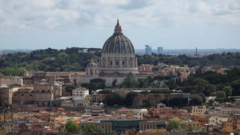Amid the somber backdrop of Pope Francis's funeral, global leaders are poised for potential unexpected diplomatic exchanges, happening on one of the largest stages for state interaction since the late Queen's funeral in 2022.
Pope Francis’s Funeral: A Diplomatic Gathering with a Twist

Pope Francis’s Funeral: A Diplomatic Gathering with a Twist
World leaders eye rare diplomatic encounters at Pope Francis's funeral amidst solemnity and tension.
In the wake of Pope Francis's passing, leaders from around the globe are expected to converge on St Peter's Square in a unique intersection of solemnity and diplomacy. The occasion presents a rare opportunity for what diplomats term "brush-by diplomacy," as they gather to honor the Pope while also potentially engaging in crucial discussions on the world's pressing issues.
While formal meetings are largely shunned in respect for the occasion, many leaders might find themselves in close proximity to one another, sparking spontaneous conversations on geopolitical matters. One European diplomat voiced the shared sentiment: “We do not want to be disrespectful to our hosts, but will there be opportunities for brush-bys? Absolutely.”
The spotlight remains on the dynamic between U.S. President Trump and Ukrainian President Zelensky, both attending the funeral, and whether they might seize the occasion to negotiate a ceasefire in Ukraine. Their seating arrangements, according to country name, may keep them apart, which some diplomats believe could be beneficial in avoiding any confrontation stemming from past disagreements.
Another possibility is a private meeting; Zelensky indicated he was prepared to connect with Trump, while doubts linger over his own attendance due to the ongoing threat from Russian strikes. The Vatican has welcomed 170 delegations, including numerous heads of state and current monarchs, raising the likelihood of unplanned diplomatic interactions during arrival or departure at Rome’s airports.
However, these moments of connection are fraught with risk. The space of the funeral also allows adversarial leaders to coexist due to the Vatican’s neutral status; notably, neither President Putin of Russia nor President Xi Jinping of China will attend.
As the ceremony approaches, attendees must navigate the balance of honoring the Pope while managing potential encounters with political rivals. Significant moments during the service, such as a tradition of shaking hands as a sign of peace, may find leaders engaging with figures they’d prefer to avoid. Past instances have illustrated this unpredictability, where leaders found themselves caught off guard by unexpected interactions.
The prospect of “working funerals”—where crucial discussions can spring forth unconventionally—has historically allowed leaders to address pressing global concerns without the expectation set at more formal summits. In light of recent high-profile funerals, the strategy remains relevant, serving as a stage for diplomacy to flourish amidst the air of collective mourning and respect.
As dignitaries gather in St Peter's Square, the world watches to see how this unique blend of respect and dialogue will unfold, potentially influencing international relations far beyond this solemn event.
While formal meetings are largely shunned in respect for the occasion, many leaders might find themselves in close proximity to one another, sparking spontaneous conversations on geopolitical matters. One European diplomat voiced the shared sentiment: “We do not want to be disrespectful to our hosts, but will there be opportunities for brush-bys? Absolutely.”
The spotlight remains on the dynamic between U.S. President Trump and Ukrainian President Zelensky, both attending the funeral, and whether they might seize the occasion to negotiate a ceasefire in Ukraine. Their seating arrangements, according to country name, may keep them apart, which some diplomats believe could be beneficial in avoiding any confrontation stemming from past disagreements.
Another possibility is a private meeting; Zelensky indicated he was prepared to connect with Trump, while doubts linger over his own attendance due to the ongoing threat from Russian strikes. The Vatican has welcomed 170 delegations, including numerous heads of state and current monarchs, raising the likelihood of unplanned diplomatic interactions during arrival or departure at Rome’s airports.
However, these moments of connection are fraught with risk. The space of the funeral also allows adversarial leaders to coexist due to the Vatican’s neutral status; notably, neither President Putin of Russia nor President Xi Jinping of China will attend.
As the ceremony approaches, attendees must navigate the balance of honoring the Pope while managing potential encounters with political rivals. Significant moments during the service, such as a tradition of shaking hands as a sign of peace, may find leaders engaging with figures they’d prefer to avoid. Past instances have illustrated this unpredictability, where leaders found themselves caught off guard by unexpected interactions.
The prospect of “working funerals”—where crucial discussions can spring forth unconventionally—has historically allowed leaders to address pressing global concerns without the expectation set at more formal summits. In light of recent high-profile funerals, the strategy remains relevant, serving as a stage for diplomacy to flourish amidst the air of collective mourning and respect.
As dignitaries gather in St Peter's Square, the world watches to see how this unique blend of respect and dialogue will unfold, potentially influencing international relations far beyond this solemn event.




















